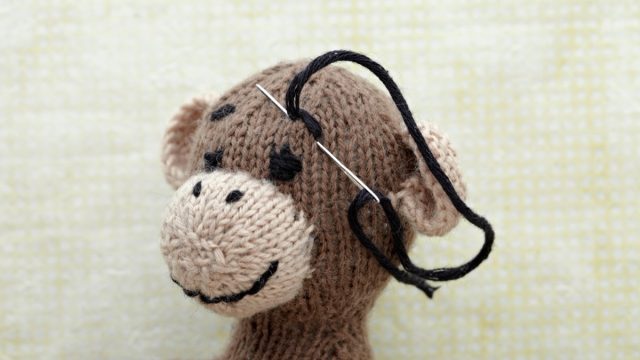Toy Monkey Reunites Holocaust Survivor with Long Lost Family, Goes Viral
Warning: Get some Kleenex, ASAP.

In 1939, 14-year-old Gert Berliner had to say goodbye to his parents as he boarded a train from Berlin to Sweden. By then, options for Jews hoping to escape Nazi Germany had virtually vanished. One of the very few possibilities that remained was Kindertransport—a rescue effort led by Jewish and Quaker organizations that smuggled children out of the country by train. The covert mission helped thousands of kids escape, and Gert was one of them. But only children were allowed on the trains. And so the young boy waved goodbye to the only parents he knew, armed with a bag that could fit little more than a small, stuffed monkey.
His parents were sent to Auschwitz, where they were murdered on May 17, 1943.
Berliner was taken in by a kind foster family in Sweden, and moved to the United States after the war. Orphaned and completely alone, he brought the toy monkey with him.
He grew up and worked as a photographer and an artist, traveled widely, and took the toy monkey with him wherever he went. He married and had a son, Uri, who, in a beautiful piece for NPR, wrote, "he was a distant father. And I was a distant son, much of our time together beset by halting, uncomfortable silences." Gert rarely spoke about his early life, or his parents, and for most of Uri's adult life, he believed "there were just three Berliners: my dad, me, and my son, Ben."
A little boy who fled the Nazis.
A toy monkey he carried with him.Decades later, the donation of that stuffed animal to a museum led to a remarkable discovery https://t.co/2UuGnf10Tv @uberliner pic.twitter.com/ySyLbDrx8Q
— David Beard (@dabeard) November 14, 2018
Then, in 2003, Aubrey Pomerance, an archivist from the Jewish Museum in Berlin, asked his father if he could donate something from his childhood that visitors to the museum could personally relate to. He gave him the toy monkey, and it made its way back to Berlin. For many years, the monkey sat in the museum.
In 2015, a woman named Erika Pettersson visited the museum and saw the monkey and a photo of a little boy named Gert Berliner. What a coincidence, she thought. Her mother's last name was also Berliner. It turns out that Gert's father had a brother, whose children had also managed to escape to Sweden. But they didn't get out via Kindertransport; instead, they were sent to work on farms in remote parts of the countryside. Though they were cousins living in the same country at the same time, they knew nothing of one another's existence.
But that all changed, thanks to the toy monkey.
Uri recently traveled to Sweden to meet his long-lost family members, and wrote that, "even though we had just met it felt good to be around my newfound relatives. To be part of a larger family—a family that hasn't just survived, but has grown and thrived."
As for Gert, who is now 95, he's grateful.
"It's a gift," he said. "In my old age, I have discovered I have a family."
And it's nice to know that he wasn't wrong all those years ago, when he believed that the stuffed monkey was a magical talisman that would reunited him with his family one day.
"Suddenly because of the monkey, I have a phone call, somebody in Sweden of all places, saying, well I think you're my cousin," he said.
When he fled the Nazis as a child, Gert Berliner packed a stuffed monkey. He kept it for more than a half-century before donating it to a museum, an act that led to a remarkable discovery: family he didn't know he had. https://t.co/hPCHlE3kQm pic.twitter.com/F3lTDdzS1z
— NPR (@NPR) November 14, 2018
The story has gone viral and, needless to say, it's making everyone cry.
I just got off the phone with @uberliner, who told the amazing story about his dad, his stuffed monkey and escaping the Nazis. He's been getting many emails and social media notes. "Usually I cover things like tariffs and trade. It couldn't be more different than this story." pic.twitter.com/Oy7ehZe9iM
— David Beard (@dabeard) November 14, 2018
The world can be a very cruel place, but it can also be magical. And for another amazing story, read about how social media helped one woman go from having no family at all to being a daughter, granddaughter, sister, and aunt.
To discover more amazing secrets about living your best life, click here to follow us on Instagram!





















